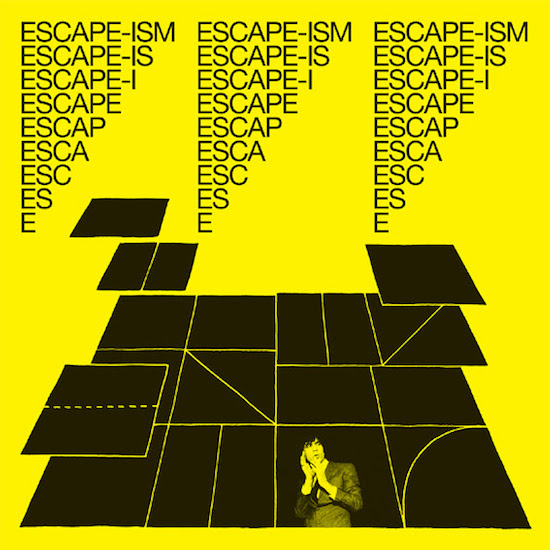We’re all trapped. Trapped in a culture of consumption, where the more we shop and consume to escape our loneliness and alienation, the more we find we’re weighed down by our chains. Ian Svenonius has been telling us this much for decades – first as the vocalist for Washington DC anarcho-punk dandies Nation Of Ulysses, and then with the revolutionary rock and soul of The Make-Up, before going on to The Scene Creamers, Weird War, Chain & The Gang and other projects, including his books The Psychic Soviet and Supernatural Strategies For Making A Rock ‘N’ Roll Group. Taking its name from a 1971 single by long-time inspiration James Brown, Escape-Ism is Svenonius’s latest incarnation. And while his previous solo album, 2001’s brilliant Play Power (released under the pseudonym of David Candy) was created with the help of collaborators, on Introduction To Escape-Ism solo means solo. This is Svenonius with just an electric guitar, a microphone, an analogue-sounding drum machine and a tape deck, creating the rawest and most stripped-back manifestation of his singular muse to date.
The theme of being alone seeps through the record’s 31 minutes. From ‘Walking In The Dark’ and ‘Lonely At The Top’, in which Svenonius begs us to accept the story of his struggle to the very pinnacle of rocknroll, through to the weird dislocation of ‘I Don’t Remember You’, this is the sound of Svenonius the ultimate outsider, bereft of his punk rock community, utterly cut off from prevailing trends and retreating into wounded, hermetic isolation. On ‘Iron Curtain’ he fantasises about rebuilding the Berlin Wall, either literally or metaphorically, and defecting to a USSR that not only no longer exists, but of course never existed as Svenonius imagines it here – a mythical communist utopia where those on the inside will be happy and fulfilled at last, and crucially the wall is to keep everyone else out. This is presented as an ideal communist bloc yet to be achieved, a mythic alternative to the cruel social Darwinism of the capitalist system we currently live under, where only the strong and the heartless can survive.
‘Almost No One (Can Have My Love)’ is both a clever love song and a critique of the economy of endless growth and acquisitiveness – if everything is available, then is anything special? “Almost anyone can be an artist,” Svenonius sings, “They can put art on the wall / All you got to do is know someone / With a wall, that’s all.” But his love is exclusive to just one person, and so is the only thing worth having. “They don’t make it anymore… you have to come to the source.” The following track, ‘They Took The Waves’ explores this idea still further – how under a system that promises we can have anything we desire (for a price), the things that really matter to us are systematically stolen, destroyed or despoiled, so they can sell you back a cheap copy.
With their basic undernourished beat and primitive, needling guitar lines, Escape-Ism sound like a suburban Suicide, Svenonius pleading, yelping and murmuring to himself like Alan Vega’s effete younger brother. He gasps, cries, swallows his words, while the faux-naif melodies and crude distorted riffs aren’t that different to those in The Make-Up’s back catalogue, just even more basic and lo-fi. The classic punk minimalism of ‘Crime Wave Rock’ is what the form would sound like if it hadn’t been stolen by the frat boys and had stayed true to weirdos and nerds like Devo or Subway Sect.
Svenonius’s revolutionary message also remains unchanged – don’t give up, stick it to the man, don’t covet what you don’t need – and has if anything grown more relevant. These situationist critiques are backed up by the musical aesthetic, where even a brief burst of saxophone feels like a luxury. He gives you no more than you need, sketching out both rhythm and melody, and delivering his diatribes in the deliberately economical code of rocknroll, leaving room to exercise your imagination rather than colonising it with excess instrumentation and surplus sounds.
Just as Alan Vega told us “We’re all Frankie”, so Svenonius shows us how even if we’re not trapped in urban hell, we’re still slaves to a system we’re supporting and buying into every day of our lives. The humour is deadly serious: Ian Svenonius is a great pop artist who sticks resolutely to his metaphor, never stepping out of character for over 30 years now, an iconoclast in the grand tradition of Andy Warhol or Gilbert & George, and a better dancer than any of them. As Diane Di Prima said, the only war is the war against the imagination. Love is the answer, less is more, and Escape-Ism begins at home.


